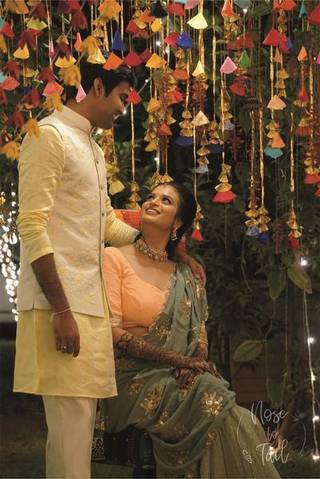
$30 trln in additional investments required to achieve net zero in 8 hard-to-abate sectors
The Net Zero Industry Tracker 2024 estimates that $30 trillion in additional capital will be required across ...

The ‘big fat Indian wedding’ was streamlined this year. As e-invites and online attendance become the norm, courtesy the pandemic, not only are weddings turning into more intimate affairs, but couples are also showing more interest in sustainable, waste-free celebrations.
“With small gatherings, zero waste can easily be achieved,” says Mumbai-based Aishwarya Lonial, who co-founded Nose to Tail with Indraja Khare, which specialises in sustainable weddings. “Right from invites to gifts, we cut down on waste generation at source. For an upcoming wedding in Delhi, we are using scrap cloth and tailor waste for the decor. We have tied up with NGOs like Feeding India and Robin Hood Army to donate excess food,” Aishwarya adds.
Sanna Vohra, founder and CEO of The Wedding Brigade, an online portal that curates wedding fashion, suggests choosing paperless or recycled invites, opting for venues with recycling/composting facilities, buying from sustainable brands and using locally sourced flowers or recycled material for decor.
Mumbai-based RJ Preeti Bindaas’ wedding was one such; she calls the event “an extension” of her sustainable lifestyle. “We upcycled used tyres, used bottles and scrap for decor. Discarded telephone directories became gift envelopes wrapped in a glossy cover (which were made from discarded car covers),” she says. Preeti continues: “Why do you need to order plastic water bottles for a two-hour function?The waste we leave behind takes millions of years to decompose.”
Kanika Subbiah, founder of Wedding Wishlist concurs. “We have 1.1 crore weddings a year in India. Tonnes of waste goes to the landfill.” Her company offers gift registry services. This, she says, can reduce waste generated by gifts alone by 50%. “Couples can also request guests to support charity as gifts,” Kanika adds.
There is a greater focus on replacing single-use plastic cutlery with steel jugs and glasses, wooden spoons, banana leaves and areca plates. Anujna Ravikumar, founder of Bengaluru-based Levitate Wedding recently helped organise a zero-waste wedding at Panchvati in Kanakapura, near Bengaluru. “We use roses, orchids, lillies and chrysanthemums sourced from farmers in the neighbourhood. The used flowers are upcycled as natural dyes,” Anujna says, adding COVID-19 has been an influencing factor on these trends.
The pandemic has revived forgotten traditions, says Arabind Chandrasekhar, managing director of Kochi-based Tamarind Event Management Solutions. “If you look back 40 years or so, weddings were much smaller and conducted at homes, the safest place for any celebration. COVID-19 has made people realise that relationships matter and not revelry.”
The Net Zero Industry Tracker 2024 estimates that $30 trillion in additional capital will be required across ...
Egypt is gearing up for the 2025 Human Development Report, and debt swap initiatives, all ...
The European Bank for Reconstruction and Development (EBRD), the United Kingdom’s High-Impact Partnership on Climate ...


اترك تعليقا